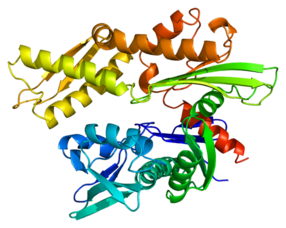Heat shock protein

Heat shock proteins (HSP) are a family of proteinn that are produced by cells in response to exposure to stressful conditions, including exposure to heat, cold, UV light, infection, exercise, starvation; fasting and hypoxia.[1] Heat shock proteins are classified by their molecular weight (e.g. hsp10, hsp40, hsp60, hsp70, ect).
Function
Heat shock proteins play the role of a chaperone for other proteins and significant part of the body's physiological stress response. HSPs are found in all cells of all organisms. These proteins also play a role in protecting from stress/apoptosis.[2] More specifically they also inhibit protein degradation, and as a result they inhibit skeletal muscle atrophy. [3] Certain HSPs appear play cytoprotective role in many human diseases, including ischemia, inflammation, and infection.[4]
ME/CFS
A Canadian research team first reported a decrease of heat shock proteins in ME/CFS patients after an exercise challenge.[5] Further study was done by a French team interested in increased oxidative stress in ME/CFS patients. In 2009 they reported a marked reduction of HSP 27 and HSP 70 variations in ME/CFS patients post-exercise, a reduction that was not seen in heathy controls.[6] These results were confirmed in 2012, using a larger sample of 43 ME/CFS patients.[7]
HSPA2, a heat shock protein-encoding gene, may also have a role in ME/CFS.[citation needed]
Hormesis
Heat shock proteins, have been shown to trigger hormesis in humans, and as a result mitochondrial biogenesis. Perhaps future treatments will incorporate either HSPs or other hormesis activating compounds, as a means to foster mitochondrial growth/repair.
Notable studies
- 2012, Chronic fatigue syndrome: acute infection and history of physical activity affect resting levels and response to exercise of plasma oxidant/antioxidant status and heat shock proteins[7] - (Abstract)
- 2009, Chronic fatigue syndrome combines increased exercise-induced oxidative stress and reduced cytokine and Hsp responses[6] - (Full text)
- 2008, Differential heat shock protein responses to strenuous standardized exercise in chronic fatigue syndrome patients and matched healthy controls[5] - (Abstract)
- 2006, - [ (Full text)]
See also
Learn more
- Roles of Heat Shock Proteins - Scientific American
References
- ↑ Zare, A (July 2011). "Effect of Ramadan fasting on serum heat shock protein 70 and serum lipid profile". Singapore Med J. 52 (7): 491–5.
- ↑ Li, Z; Srivastava, P (2004). "Heat-shock proteins". Curr Protoc Immunol (Appendix 1T). doi:10.1002/0471142735.ima01ts58. PMID 18432918.
- ↑ Patrick, Rhonda. "The Surprising Health Benefits of Extreme Hot and Cold Temperatures". Mercola.
- ↑ Gabriella, Santoro (June 1999). "Heat shock factors and the control of the stress response". Biochemical Pharmacology. 59: 55–63.
- ↑ 5.0 5.1 Thambirajah, Anita A.; Sleigh, Kenna; Stiver, H. Grant; Chow, Anthony W. (December 1, 2008). "Differential heat shock protein responses to strenuous standardized exercise in chronic fatigue syndrome patients and matched healthy controls". Clinical and Investigative Medicine. Medecine Clinique Et Experimentale. 31 (6): E319–327. ISSN 1488-2353. PMID 19032901.
- ↑ 6.0 6.1 Jammes, Y.; Steinberg, J.G.; Delliaux, S.; Brégeon, F. (August 2009). "Chronic fatigue syndrome combines increased exercise-induced oxidative stress and reduced cytokine and Hsp responses". Journal of Internal Medicine. 266 (2): 196–206. doi:10.1111/j.1365-2796.2009.02079.x. ISSN 1365-2796. PMID 19457057.
- ↑ 7.0 7.1 Jammes, Y.; Steinberg, J.G.; Delliaux, S. (July 2012). "Chronic fatigue syndrome: acute infection and history of physical activity affect resting levels and response to exercise of plasma oxidant/antioxidant status and heat shock proteins". Journal of Internal Medicine. 272 (1): 74–84. doi:10.1111/j.1365-2796.2011.02488.x. ISSN 1365-2796. PMID 22112145.

